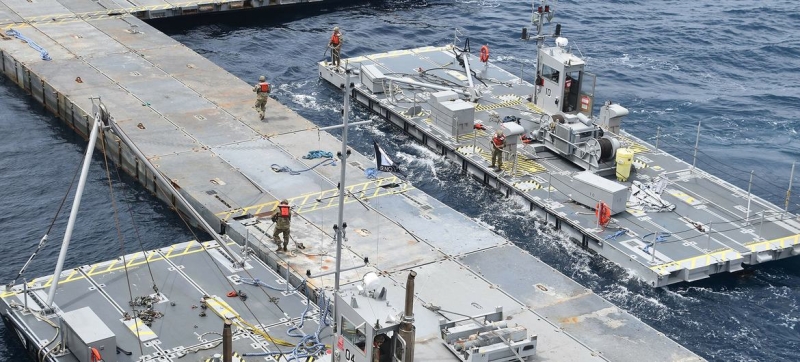
Floating pier delivers trucks of aid to Gaza coast Gaza: UN welcomes aid delivery via floating pier, but calls for land routes to open as well Humanitarian aid
Trucks carrying aid to Gaza are now being transported to the enclave’s shores on a floating pier built by the US military. The UN welcomes this opportunity to deliver goods, but warns that the capacity of this route is limited.
The UN Office for the Coordination of Humanitarian Affairs reported on Friday that the sea corridor cannot replace the critical land routes that represent the fastest and most effective way to deliver aid to the besieged enclave. The UN reminds that more than two million Palestinians in Gaza today are in desperate straits and dependent on aid.
Additional aid route
US Central Command announced that the floating pier began moving at approximately 9 a.m. local time on Friday, assuring that no US soldiers went ashore.
The United Nations welcomes any effort to get aid to the Gaza Strip, UN deputy spokesman Farhan Haq said in New York on Friday. “We are grateful to the United States, as well as Cyprus and other UN member states, for supporting the maritime corridor as an additional route for assistance to Gaza,” he said.
Haq explained that “after several months of discussions with the relevant authorities, the UN agreed to support the delivery of aid to Gaza via a floating dock, subject to the neutrality and independence of humanitarian operations.”
Humanitarian situation
According to the representative of the Office for the Coordination of Humanitarian Affairs Jens Laerke, almost 640,000 people were forced to leave Rafah recently due to the Israeli military operation. Many fled to overcrowded Deir el-Balah, located in central Gaza. The massive influx of displaced people is complicating the already catastrophic humanitarian situation. Gaza and one in Deir el-Balah. About a dozen bakeries have stopped operating due to a lack of fuel as well as necessary ingredients amid ongoing fighting.
The movement from Rafah to Khan Younis has also worsened the crisis in water supply and sanitation – sewage and solid waste spread along roads, displaced persons camps and the rubble of destroyed houses.
The World Health Organization (WHO) emphasizes that the biggest problem now is fuel. Only 13 of Gaza’s 36 hospitals are partially operational. To change this situation, the health system needs from 1.4 to 1.8 million liters of fuel per month, and since the border closure, only 159,000 liters have entered Gaza.
